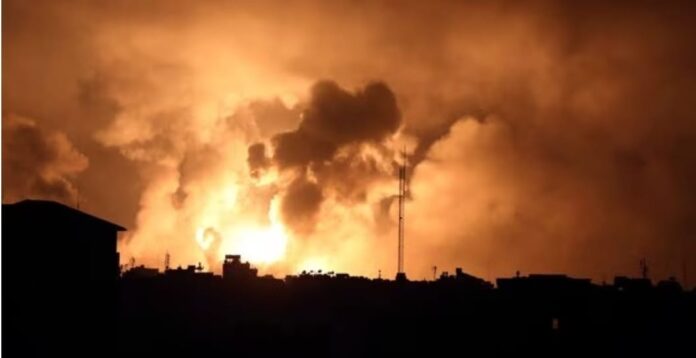Overnight, the conflict in Gaza has experienced a notable escalation, as reported by sources in the region. The Israeli military has announced an intensified bombing campaign, along with expanded ground operations.
They have targeted Hamas positions and reported the death of the head of Hamas’s paraglider operations. According to an Israeli military spokesperson, Israeli forces have entered Gaza and are currently engaged in active operations on the ground.
Communication networks in Gaza have been disrupted since last night, making it difficult to contact residents and obtain casualty figures. Emergency services im Gaza say more than a thousand bodies are under the rubble.
The conflict between Israel and Gaza began with the October 7 Hamas attacks, which resulted in the death of 1,400 people and the kidnapping of 229 prisoners from the Israeli side. On the Palestinian side, the health ministry in Gaza reports that the number of casualties since Israel started bombing in retaliation has reached 7,000, with 18,000 others wounded, many of them seriously.
The Palestinian Health Service submitted the list of Palestinian victims to the world body, as reported by the UN. This comes after President Biden expressed doubt about the number of people killed in Gaza.
The ongoing bombardment of Gaza, conducted by Israeli forces from air, sea, and land, has created significant challenges for humanitarian organizations such as the International Committee of the Red Cross (ICRC) and UN agencies in their work.
The continuous attacks make it extremely difficult for these organizations to provide much-needed assistance to the affected population.
Amidst the violence, Hamas has claimed that Israeli forces attempted to enter the Gaza enclave from different directions but were forcefully repelled and in process they lost soldiers and military equipment. This indicates a fierce resistance from Hamas, which is determined to defend its territory against any attempted incursions.
Despite these intense clashes, diplomatic efforts to reach a ceasefire persist. The UN General Assembly has urged for an immediate humanitarian truce, with 120 states voting in favor of a resolution proposed by Jordan.
However, it is worth noting that 14 countries, including the US and Israel, rejected the non-binding resolution, while 45 countries abstained. Nevertheless, the fact that a significant number of nations supported the resolution indicates a widespread desire for an end to the inhumane bombardment of Gaza.
International mediators, regional actors, and various nations are actively engaged in trying to bring an end to the hostilities. However, Hamas has firmly stated that it will not engage in negotiations while under fire. This stance highlights the primary concern for Hamas, which is to ensure the safety and security of the Palestinian population in Gaza before entering into any talks.
The refusal by Hamas to negotiate under fire poses a significant challenge to the diplomatic process. It emphasizes the urgent need for a humanitarian truce to halt the violence and allow negotiations to take place without further endangering the lives of civilians.
The international community continues to push for a ceasefire, recognizing the importance of addressing the underlying issues causing the conflict and finding a sustainable solution that brings lasting peace to the region.
Meanwhile, The United States has reported multiple attacks on its military bases in Syria and Iraq. These attacks have raised concerns about the escalation of violence and the potential for further regional destabilization. Despite these attacks, the US maintains that it does not desire a spread of conflict in the region.
In recent reports, there are indications that the US conducted an attack on a military camp in Syria operated by Iranian forces. This attack signifies a significant development in the ongoing tensions between the US and Iran.
The targeting of Iranian-backed militias by the US signals a clear message about its willingness to take action against forces it considers to be a threat.
The attacks on US military bases and the subsequent retaliation against Iranian forces highlight the complexity of the situation in the region. The involvement of multiple actors, including the US, Iran, and various militias, further complicates the dynamics of the conflict.
The potential consequences of these attacks and counterattacks pose risks for regional stability and the overall security situation in Syria and Iraq. Efforts to de-escalate tensions and find diplomatic solutions are crucial in order to avoid further deterioration of the situation.
The international community needs to engage in dialogue and mediation to prevent a further escalation of violence and work towards a sustainable resolution that addresses the underlying issues at hand. The end
Mohamed Mohamoud Adde is an academic and a political Analyst specialising in offering expert analysis, insight and recommendations on Political developments


